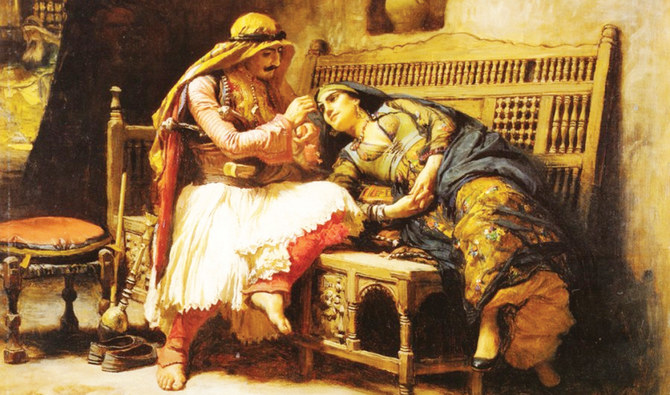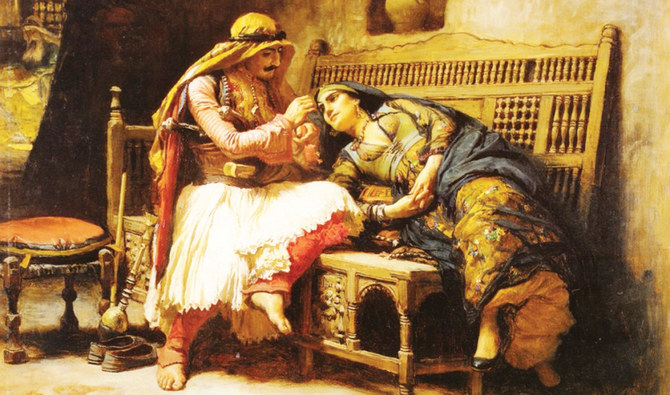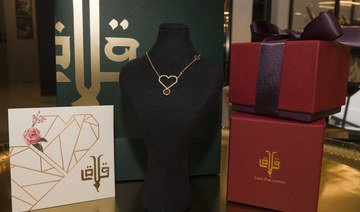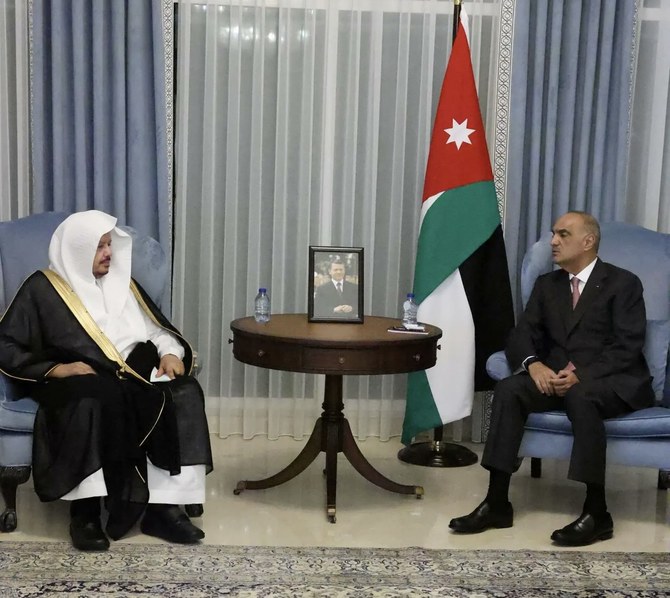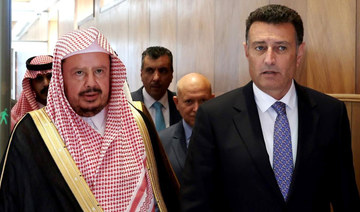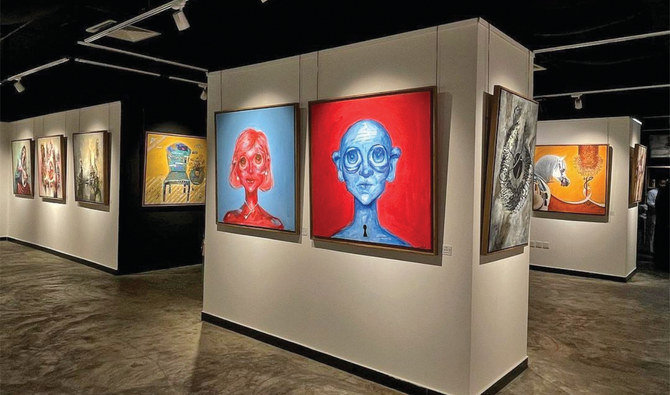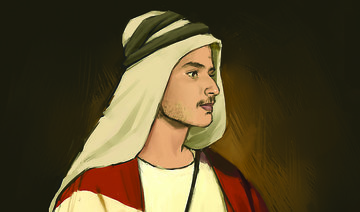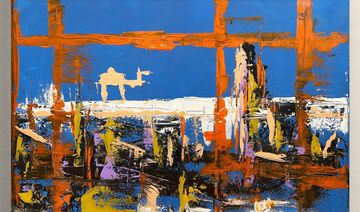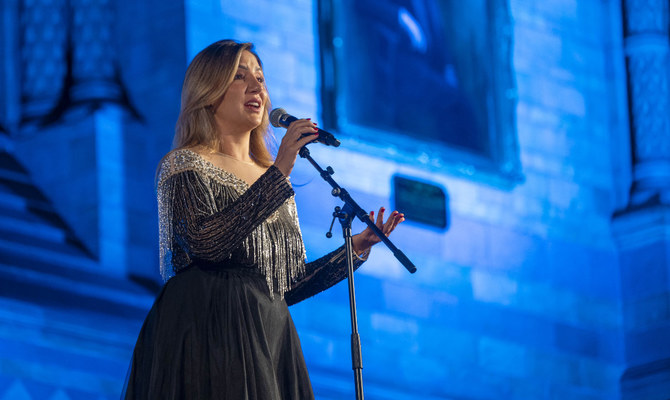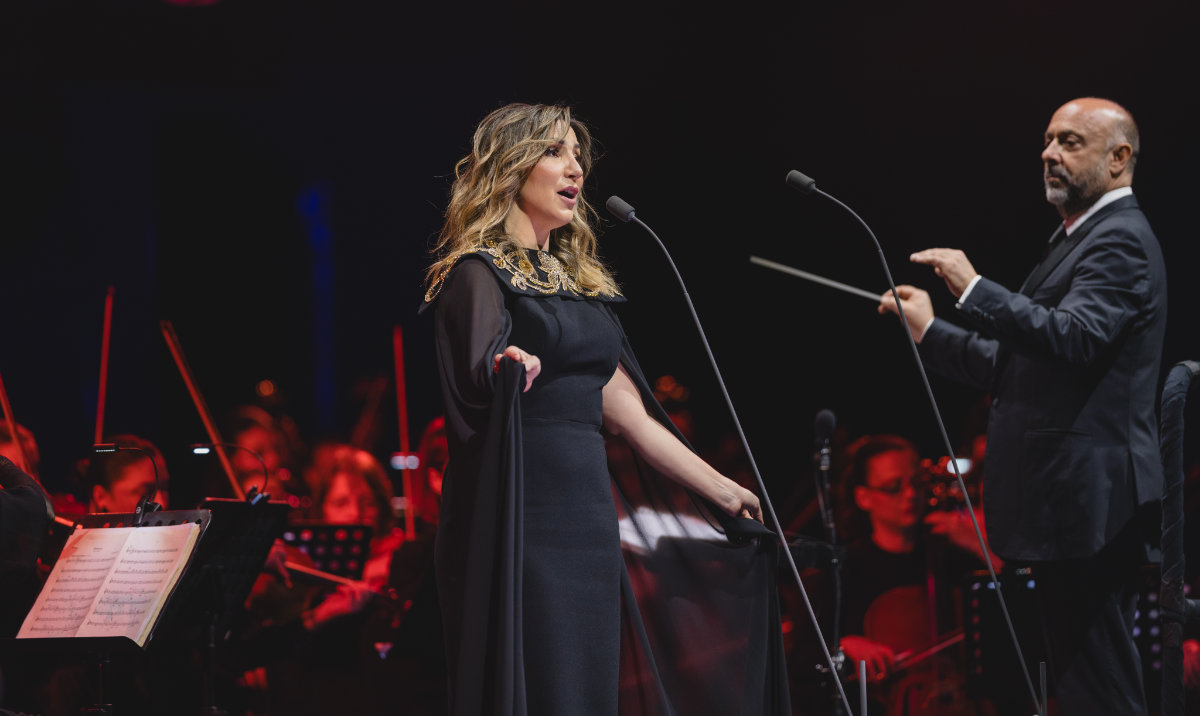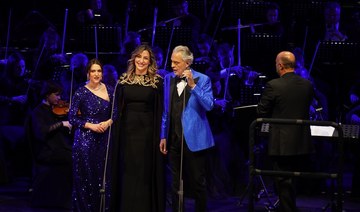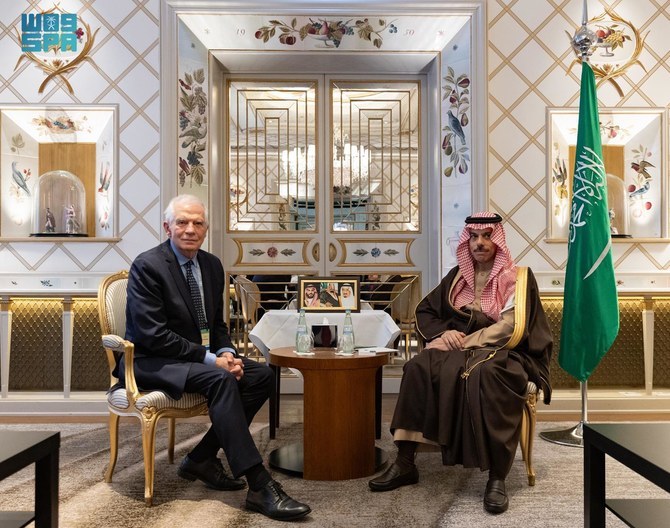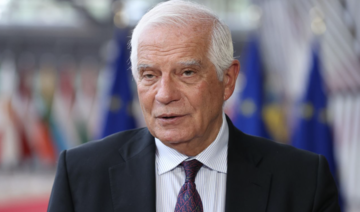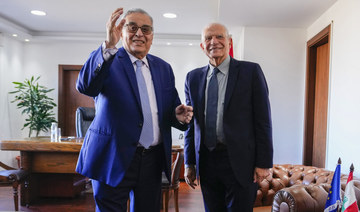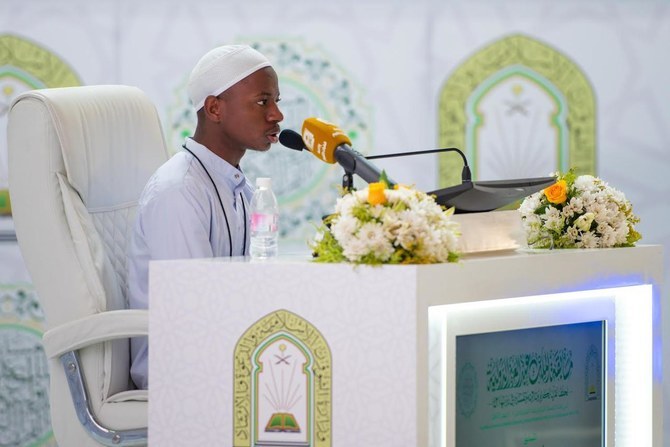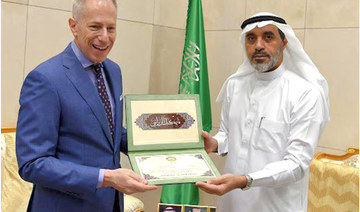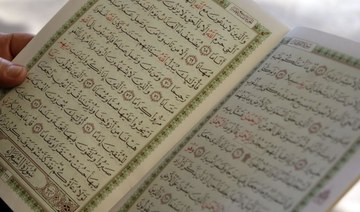LONDON: As Valentine’s Day approaches there is little, at first glance, to be found in common between the persecution of an early Christian priest sentenced to death by the Roman Empire and the tale of Antar and Abla, one of the most famous love stories in Arabic poetry, invoked by lovers across Saudi Arabia on Feb. 14.
In fact, although both tales have become inextricably linked through the exchange of love tokens on Valentine’s Day — itself an invention of the European Middle Ages — they also share a deeper meaning, and an origin in darker times, that perhaps explains their enduring appeal.
Although wrapped today in the red-hued hearts-and-flowers packaging of love, neither tale has what could remotely be described a happy romantic ending.
St. Valentine, after all, was beaten with clubs and had his head cut off for his troubles.
Antarah ibn Shaddad, the son of a black slave woman and the author of a series of autobiographical pre-Islamic poems, fought his entire life to prove himself worthy of both his father’s Arabic tribe and of the hand of the woman he loved — and yet died with that love unrequited.
Rather than simply celebrating the joy of romance, in other words, the true message of both Valentine and Antarah is that in life there are times when we must fight for what we believe in and that to give up that fight, no matter how hopeless the cause, is to surrender a vital part of ourselves.
St. Valentine is thought to have been executed in about AD 269 on the orders of the Roman emperor Claudius II, for the “crime” of defying the empire and marrying couples of the persecuted Christian faith.
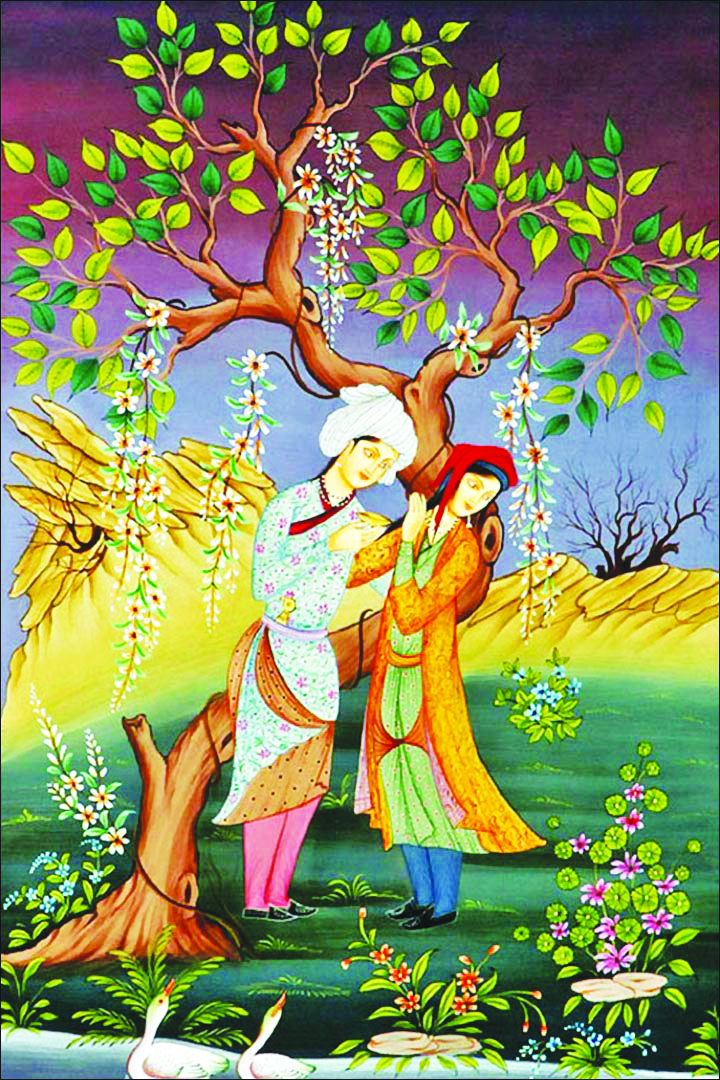 Canonized by the Catholic Church, he was given an annual feast day on Feb. 14, a festival that at some point in medieval England drifted away from being a commemoration of ultimate sacrifice in the name of faith and evolved into a more general celebration of love.
Canonized by the Catholic Church, he was given an annual feast day on Feb. 14, a festival that at some point in medieval England drifted away from being a commemoration of ultimate sacrifice in the name of faith and evolved into a more general celebration of love.
Over the centuries, Valentine’s Day evolved into a tradition that has transcended national and cultural boundaries to become a global celebration of romance, close to the hearts of young lovers and the makers of greetings cards and heart-shaped chocolates everywhere.
The first known reference to Valentine’s new role as the patron saint of lovers is to be found in two poems written between 1380 and 1390 by the English poet Geoffrey Chaucer, author of “The Canterbury Tales.” One, “Parliament of Fowls,” describes a gathering of birds to choose their mates for the year ahead on “seynt valentynes day.”
The poem is described by the British Library, which holds a 15th-century copy of the manuscript, as “a humorous and at times philosophical exploration of the idea of love.”
The story of Antarah ibn Shaddad, the warrior poet of pre-Islamic Arabia, is an epic tale whose origins are, if anything, even less certain than those of the Valentine’s Day with which it has become incongruously entwined.
The generally accepted version of Antarah’s life is that he was born in the Nejd in about AD 525 (some 250 years after the execution of Valentine), the son of Shaddad Al-Absi, an Arab warrior of the Banu Abs tribe, and Zabibah, an Ethiopian slave. Dark-skinned like his mother, Antarah was regarded by his community and his family, including his father, as himself no better than a slave. As a young man he set out to prove his valor and win his freedom through his legendary exploits in battle.
Although it is the immortal love story of “Antar and Abla” that has endured the passage of over 1,400 years, finding its way into the Saudi high school curriculum and the expressions of affection voiced by young lovers today, there is vastly more to the story of the warrior poet than a simple tale of unrequited love for one of his cousins.
Ibn Shaddad is considered to be the author of one of the seven famed poems compiled in the 8th century as Al-Mu’allaqat, “the hanged poems,” a collection of the best pre-Islamic poetry said by legend to have been inscribed in gold letters on linen and hung on the walls of the Kaaba in Makkah.
Known only as “The Poem of Antar,” Ibn Shaddad’s contribution is a rich blend of longing for his love — “verily you have occupied in my heart the place of the honored loved one, so do not think otherwise than this, that you are my beloved” — and brutal testimony to his prowess as a warrior: “I pierced him with my spear, and then I set upon him with my Indian sword pure of steel, and keen.”
The bulk of the poems attributed to Ibn Shaddad are, however, overwhelmingly focused on warfare rather than on matters of the heart.
In 2018, the Library of Arabic Literature, supported by a grant from the New York University Abu Dhabi Institute, published the first translation into English of more than 40 poems attributed to Ibn Shaddad. Only some of the poems in the anthology “War Songs” mention Abla and yet, as the editor’s introduction notes, “as ‘Antar and Abla’, this story of unrequited and doomed love enchanted and captivated subsequent centuries and continues to weave its spell today.”
Regardless, the anthology is a fearsome collection that drips blood and gore. Here Ibn Shaddad is chiefly a fighter, not a lover, an outsider determined to be accepted, but on his own terms, a black warrior-poet “belligerent, defiant, brutal, uncompromising, unsettling” whose poetry “breathes a spirit of indomitability, pride, and loyalty to kith and kin.”
Wielding spear, sword and bow and arrow with deadly precision, he carves a bloody path through his people’s enemies, leading his Arab cavalry into battle with their “banners flapping like vultures’ shadows.” As he strews the remains of his opponents across the desert sands, he makes no bones about his calling:
“I am Death.
I have felled many a foe,
their chests
dyed in rivers of red jiryāl,
their bodies unburied
on the open plain,
their limbs torn to shreds
by dusky wolves,
aortas pierced
by the pliant spear
gripped tight
as I closed in.”
Not much romance there, in other words.
Fortunately for the lovers of today who invoke the tale of Antar and Abla, at some point in the 11th or 12th century Ibn Shaddad was reinvented as a lover rather than a fighter, in much the same way that the festival commemorating St. Valentine’s grisly end was later hijacked in the name of love.
The anthology includes eight poems taken from “The Romance of Antar,” a 10,000-verse epic composed long after our hero’s death that was to spread his fame — and his softer side — far and wide.
In 1868, the romance inspired the Russian composer Nikolai Rimsky-Korsakov to write “Antar,” his second symphony. By the late 18th century, translations were circulating in the US and the great European capitals, with one American critic enthusing in 1896 that the romance was “the free expression of real Arab hero-worship ... even in the cities of the Orient today, the loungers over their cups can never weary of following the exploits of this black son of the desert who in his person unites the great virtues of his people, magnanimity and bravery, with the gift of poetic speech.”

Aimed at the heart: Koka, the late Egyptian actress known for her roles as a Bedouin, played Abla (Antar’s beloved) in four Egyptian films. (Supplied)
It is uncertain, but unlikely, that any of the poetry in “The Romance of Antar” was composed by Antar himself, but without doubt it conveys the spirit of the man as it has been handed down over the centuries.
With that in mind, and with Valentine’s Day upon us, we’ll leave the last word to him:
“Daughter of Malik, sleep is forbidden me.
How could I sleep on this bed of coals?
I’ll weep till the birds hear of my misery and the turtledoves coo
my elegy.
I’ll kiss the ground wherever you’re camped.
May its tear-stained sands dampen the fires that consume me.”
And if you put that in your Valentine’s Day card, you won’t go far wrong.


